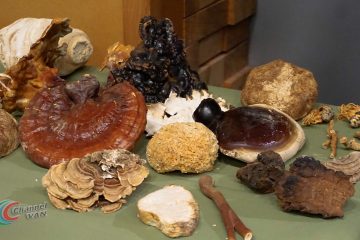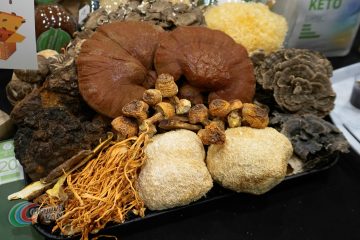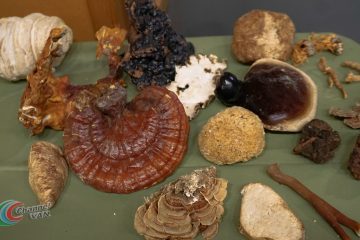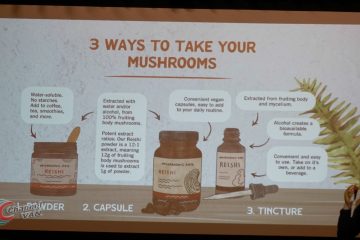HEALTH
Nova Sea Atlantic® Premium Sea Cucumber Capsules




Dec.24.2023
- NATURAL SOURCE OF ANTIOXIDANTS: NOVA SEA ATLANTIC offers high purity Sea Cucumber capsules that are potent antioxidants for those seeking a natural approach to help protect cells against the oxidative damage caused by free radicals. Nourish yourself naturally today.
- DEEP SEA SELF CARE: Sea cucumbers are well known as a collagen supplement & immune system booster however, ours are also a source of amino acids which will help you maintain your health overall. Containing essential minerals which support hair, nail and muscle while also supporting your skin and bone health. Enhance your wellness with all natural sea cucumber pills today. You can trust NOVA SEA ATLANTIC to support you along your selfcare journey.
- CERTIFIED PREMIUM QUALITY: NOVA SEA ATLANTIC capsules are derived from 100% wild caught Sea Cucumbers from just off the coast of Nova Scotia in Canada. Processed sustainably in an approved production facility in Canada, you can enjoy all the benefits of sea cucumbers and support local workers in the Maritimes. Rich in bioactive peptides, joint-nourishing polysaccharides, omega 3 & 6, essential amino acids, frondoside and more. Treat yourself to a premium Canadian Sea Cucumber experience.
- BACKED BY CENTURIES OF TRADITIONAL CHINESE MEDICINE: In China, sea cucumbers are known as “Hǎishēn” which translates to “Ginseng of the Sea” with thousands of years of history as a food with powerful health benefits. Reap the benefits of a rich cultural history in a convenient capsule form and incorporate sustainable Canadian sea cucumber into your self care routine
- R&D AND INNOVATION IS OUR PRIORITY: AKSO Marine Biotech Inc, the producer of Nova Sea Atlantic sea cucumber pills, works closely with Canadian government agencies and Universities exploring the marvels of the Canadian oceans. Our in-house R&D team is constantly innovating to seek the next breakthrough for your personal wellness. For decades, we have been committed to quality, safety, and sustainability. Always pure products without harmful fillers, chemicals or additives.






Mushroom Medicine
Dec.01 2023
Mushrooms have been used for medicinal purposes for centuries in various traditional medicines around the world. Here are some of the potential benefits of mushroom medicine:
Boosts the immune system: Many mushrooms contain beta-glucans, which are complex sugars that can enhance the immune system by activating immune cells and increasing their activity.
Anti-inflammatory properties: Mushrooms such as Reishi, Cordyceps, and Turkey Tail have been found to have anti-inflammatory effects that may reduce inflammation in the body and help alleviate symptoms of inflammatory conditions such as arthritis.
Antioxidant properties: Many mushrooms contain compounds such as polysaccharides and triterpenoids that have potent antioxidant properties. These compounds can help protect cells from damage caused by free radicals, which may contribute to aging and the development of chronic diseases.
Improves cognitive function: Certain mushrooms such as Lion’s Mane and Cordyceps have been shown to have neuroprotective effects and may enhance cognitive function, memory, and learning.
May help fight cancer: Some mushrooms contain compounds such as beta-glucans and polysaccharides that have been found to have anti-tumor properties and may help prevent or treat cancer.
It’s important to note that while many mushrooms have potential health benefits, they should not be used as a substitute for medical treatment. If you are considering using mushroom medicine for a specific condition, it’s always best to consult with a healthcare professional first.
BBC experiment: Is coconut oil a superfood or a heart disease killer?
Nov.03.2023
Dr. Michael Mosley BBC science presenter
Recently, sales of coconut oil have boomed, possibly due to the celebrity effect. It is claimed that coconut oil cures all manner of ailments, from bad breath to indigestion.
Hollywood star Angelina Jolie is said to eat a spoonful of coconut oil in her breakfast almost every day. She also cooks with coconut oil and uses it as a skin moisturizer.
Is coconut oil really so miraculous? Many scientists are sceptical about the health benefits of coconut oil.
Moreover, the scientific community regards coconut oil as a bad fat, as it is high in saturated fat (86%), much higher than butter (51%) and lard (39%).
Therefore, the BBC “Trust Me, I’m a Doctor” programme decided to do an experiment to see if coconut oil is really a superfood or junk food.
Eating foods high in saturated fat leads to an increase in bad cholesterol (LDL) in the blood.
Cholesterol and heart disease
High levels of bad cholesterol in the body increase the risk of heart disease.
However, on the other hand, while saturated fat is harmful to health, it can also increase the level of good cholesterol (HDL) in the body. Good cholesterol protects the heart.
In other words, some foods can increase the total cholesterol content but are still beneficial to the heart.
Coconut oil experiment
Although coconut oil is said to have many miraculous properties, there are no reliable human trials to test its effectiveness.
So we decided to do this experiment. The “Trust Me, I’m a Doctor” team invited 94 volunteers aged between 50 and 75 years old. They had to have no history of diabetes or heart disease.
We decided to test the effects of different fats on the volunteers’ cholesterol levels.
We divided the volunteers into three groups. The first group had to eat 50 grams of high-quality coconut oil every day for four weeks; the second group had to eat the same amount of high-quality olive oil every day for four weeks; and the third group had to eat unsalted butter.
Olive oil is widely regarded as a healthy food and is an important element of the Mediterranean diet.
Before the volunteers began the trial, we took their blood samples, particularly their levels of LDL and HDL in the body.
Because these two indicators are most important for the risk index of heart disease, especially the ratio of total cholesterol to good cholesterol, which is best kept below 4.
The results were surprising
The results of the experiment showed that the volunteers who ate butter had an increase in bad cholesterol levels of about 10% and an increase in good cholesterol levels of 5%.
The volunteers who ate olive oil had a slight decrease in bad cholesterol levels and an increase in good cholesterol levels of 5%.
But what was most surprising was the group of volunteers who ate coconut oil. Not only did their levels of bad cholesterol in the body not increase, but their levels of good cholesterol skyrocketed by 15%.
On the surface, it appears that people who eat coconut oil…
How to keep your body healthy:



28.Oct.2023
Here are some tips to keep your body healthy:
Exercise regularly: Engage in regular physical activity such as walking, jogging, swimming, or any other form of exercise that you enjoy. Aim for at least 30 minutes of moderate activity each day.
Eat a balanced diet: Consume a diet that is rich in whole grains, fruits, vegetables, lean proteins, and healthy fats. Avoid processed foods, sugary drinks, and excessive amounts of salt and saturated fats.
Get enough sleep: Aim for 7-8 hours of sleep each night to help your body recover and recharge.
Stay hydrated: Drink plenty of water and avoid excessive amounts of caffeine and alcohol.
Manage stress: Find ways to manage stress such as practicing relaxation techniques, meditation, or exercise.
Avoid smoking and limit alcohol consumption: Smoking and excessive alcohol consumption can have harmful effects on your body, so it’s best to avoid them altogether or limit them as much as possible.
Regular health check-ups: Schedule regular health check-ups with your doctor to monitor your overall health and catch any potential health issues early.
By following these tips, you can help keep your body healthy and improve your overall well-being.
The 6 Foods & Drinks To Avoid Before Bed, According To A Dietitian

mbg Spirituality & Relationships WriterBy Sarah Regan
Sep.26.2023
To eat a bedtime snack or not to eat a bedtime snack? That’s the question. On the one hand, going to bed on an empty stomach can activate cortisol, the stress hormone. But on the other, eating certain foods too close to bedtime can disrupt your sleep, too. For some more insight on which snacks to go for—and which ones to avoid—we asked registered dietitian Julie Stefanski, M.Ed., RDN.
6 foods & drinks to avoid before bed:
1. Spicy foods
If you’re a big fan of spicy foods, you might be better off saving them for lunch or an early dinner, Stefanski tells mbg.
That’s because your favorite curry can mess with digestion, even in the middle of the night after you’ve already fallen asleep. Spicy foods also have high levels of capsaicin, a phytochemical that increases metabolism and thermogenesis (calorie burn for heat), which can also interfere with some people’s sleep.
2. Alcohol
Stefanski notes that alcohol is well known for disrupting sleep, and plenty of research confirms this. Not only does it interfere with REM sleep, but it can also make waking up the following morning that much more difficult.
3. Fried and fatty foods
Fried and fatty foods are also known to disrupt digestion during the night, Stefanski explains. Healthy fats like nuts and seeds or avocado, for example, are fine, but saturated fats and fried foods are best avoided.
4. Acidic foods
Stefanski notes that one of the best approaches to evening eating is to try to decrease stomach acid production. Not eating too close to bedtime will help this, and of course, simply avoiding acidic foods is also a good bet. This includes everything from sugar to grains, certain dairy and meat products, and baked goods. Check out our comprehensive guide to acidic foods for more information.
5. Carbonated and caffeinated beverages
Remember that caffeine isn’t the only caffeinated beverage to avoid before bed: Soda and caffeinated tea can keep you awake, too. Even if you think you’re unaffected by caffeine, it’s still a good idea to have a cutoff time during the day, she adds. Carbonated beverages, Stefanski explains, can also disrupt digestion.
6. Big meals
Lastly, as a general rule of thumb, you should avoid eating large amounts of any food before bed, Stefanski tells mbg. Trying to fall asleep with a full belly is far from comfortable, and continuing with digestion through the night requires energy. Eating larger lunches and lighter dinners tends to help promote sleep.
What to eat instead.
If you’re in need of a bedtime snack, don’t worry; there are options that can actually be sleep-supporting rather than sleep-inhibiting.
Magnesium-rich foods like bananas, chickpeas, nuts and seeds, and dark chocolate can all satisfy your nighttime hunger while also giving you a healthy dose of magnesium, which is known for supporting sleep.* Just be sure to keep it light, as you don’t want to overdo it and end up too stuffed.
To get your magnesium fix without risking stomach upset, you can also take mbg’s sleep support+ supplement, which combines magnesium with other proven sleep enhancers like jujube and PharmaGABA® for deeper sleep and more energized mornings.*
The takeaway.
Everybody (and every body) is different, but there are certain types of foods that tend to disrupt sleep. If you’re experiencing sleep issues, try cutting the aforementioned food and beverage groups from your nightly diet. When you do reach for a bedtime snack, instead go for magnesium-rich, sleep-supporting snacks.
Health Benefits of Green Tea
Aug.24.2023
Thanks to its high antioxidant content, green tea may help protect you from diseases like Alzheimer’s, Parkinson’s, osteoporosis, and type 2 diabetes. Learn more about green tea’s benefits and risks.
:max_bytes(150000):strip_icc():gifv():format(webp)/green-tea-shutterstock_670791586-599d9a86281b40fe8d162acc19132335.jpg)
For thousands of years, people in China and Japan have consumed green tea for its soothing flavor and therapeutic benefits. Research has found drinking green tea may protect against heart disease, help manage type 2 diabetes, and even support bone health.
While green tea is made from the same leaves as black tea, green tea leaves are not fermented. This not only preserves the tea’s green color but also enhances its antioxidant content, which may explain why it’s so healthful.
Here’s an overview of green tea’s health benefits and risks as well as tips for incorporating it into your diet.
Benefits
Sipping green tea on the regular may help prevent some chronic health conditions and manage others. So far, research has found green tea:
May improve mental health
There is a chemical explanation for why sipping a hot cup of green tea can be so relaxing. Tea—along with some mushrooms—contains an amino acid called theanine, which research has found may:
- Relieve stress
- Induce relaxation
- Combat anxiety from caffeine
Green tea in particular has the highest concentration of theanine compared to other types of tea like oolong, black, and white tea, according to a 2016 study published in Pharmacognosy Magazine.
A 2020 review published in Plant Foods for Human Nutrition found that taking a 200 to 400 milligrams (mg) supplement of theanine daily reduced stress and anxiety in people exposed to stressful conditions.
Another 2019 study, published in Nutrients, of 30 people with no major psychiatric conditions found that those who took 200 mg a day of theanine for four weeks saw greater improvements in depression, anxiety, and sleep compared to those who took a placebo.
While both these studies highlight the potential mental health benefits of theanine, the amounts of theanine they used is much more than the amount you would find in a cup or two of green tea.
Might enhance memory
Research has also found that green tea can improve memory, partially thanks to its theanine content. For example, a 2014 study published in Psychopharmacology of 12 healthy volunteers found that green tea extract improved subjects working memory—a type of short-term memory important for planning, comprehension, reasoning, and problem-solving.
Patients were given a milk-based drink that contained either 27.5 mg green tea extract or a placebo. They then completed certain tasks while an MRI tracked their brain activity. Those who consumed the green tea extract saw greater brain connectivity—aka how well different areas of the brain work together—as well as improved working memory and task performance.
Since the study used such a small sample of patients, the results are less definitive. More research is needed to further explore how green tea influences memory.
Protection against neurodegenerative diseases
Some research has found drinking green tea can protect against certain neurodegenerative diseases, like Alzheimer’s and Parkinson’s. This is likely due to green tea’s high concentration of powerful compounds called antioxidants, according to a 2019 research review published in Molecules. Antioxidants defend cells against damage that, over time, would otherwise lead to neurodegenerative diseases.
A 2022 study published in Frontiers in Nutrition found that after following 1,545 elderly people in China with healthy brain functioning for one year, those who habitually drank tea—including green tea—had lower rates of cognitive decline compared to non-tea drinkers. This was true even after researchers adjusted for factors like education, smoking, and exercise.
Cognitive decline is one of the first noticeable symptoms of Alzheimer’s and related forms of dementia, according to the Centers for Disease Control and Prevention (CDC). It refers to worsening or more frequent instances of confusion and/or memory loss.
Could lower cholesterol
About 38% of American adults have high cholesterol levels, which raises their risk of heart attack and stroke, according to the CDC. The good news? Green tea might help.
A 2020 meta-analysis of 31 studies published in Nutrition Journal found that consuming green tea was associated with lower levels of both total cholesterol and LDL (aka bad) cholesterol.
Can reduce blood pressure
In addition to lowering cholesterol levels, green tea may protect heart health by lowering blood pressure. A 2020 meta-analysis in Medicine of 1,697 people found that drinking green tea significantly reduced blood pressure, particularly in those with high blood pressure and the greatest risk of cardiovascular disease.
That’s key since nearly 50% of heart disease cases and 60% of strokes are due to high blood pressure, per the National Library of Medicine. If high blood pressure is left untreated, it can also lead to kidney failure.
Green tea’s ability to lower blood pressure may be due to its high antioxidant content, according to the same 2020 analysis listed above. These antioxidants reduce inflammation and dilate blood vessels so blood can flow more easily.
However, most of the studies assessed in the analysis only lasted between three and sixteen weeks, meaning it’s not clear how drinking green tea for longer may or may not improve blood pressure.
May prevent stroke
Stroke remains a leading cause of death and disability for adults in the United States, according to the CDC. Drinking green tea may be one way to help prevent your risk of stroke.
For instance, a 2020 study in the American Journal of Clinical Nutrition, tracked the tea-drinking habits of nearly half a million Chinese adults. It found that consuming tea—especially green tea—was associated with a lower risk of stroke. In fact, the more green tea people drank, the lower their risk of stroke.
Potentially protects bone health
Green tea may also prevent the loss of bone mass. For example, a 2022 study published in Nutrients found that of almost 6,500 postmenopausal Korean women, those who did not consume any green tea or consumed less than one cup daily for the past year were more likely to have lost bone mass in their spine or thigh compared to those who drank green tea three times a day.
Reduced bone mass increases the risk of osteoporosis, a disease that makes bones more fragile and can lead to fractures of the hip, spine, or wrist, per the National Library of Medicine. Postmenopausal women in particular are at a greater risk of developing osteoporosis.
This may explain why a 2017 analysis published in Medicine concluded that tea consumption was linked to a reduced risk of osteoporosis, likely due to its high concentration of antioxidants which help prevent bone loss and enhance bone formation.
Helps prevent and manage type 2 diabetes
Consuming tea—including green tea—may be an effective way to prevent and manage type 2 diabetes, according to a 2019 review published in Antioxidants. The review found that green tea antioxidants, in particular, could reduce insulin resistance.
Insulin resistance occurs when cells are less sensitive to the hormone insulin, which helps cells convert blood sugar to energy. It is one of the major risk factors for developing type 2 diabetes, according to the CDC.
Improved longevity
Drinking tea, including green tea, is associated with a longer and healthier life, according to 2020 research published in the European Journal of Preventive Cardiology.
The study followed 100,902 participants in China with no history of heart attack, stroke, or cancer for over seven years. It grouped participants as either:
- Habitual tea drinkers, meaning they consumed tea three or more times a week.
- Non-habitual tea drinkers, meaning they consumed tea less than three times a week. .
Compared to non-habitual tea drinkers, those who drank tea three or more times a week had a reduced risk of mortality from all causes. They also had a reduced risk of developing atherosclerotic cardiovascular disease, which is when plaque builds up in blood vessels, increasing the risk of heart attack or stroke, according to the American Heart Association (AHA).
Green tea, in particular, was associated with a lower risk of dying from all causes except for coronary heart disease. Researchers believe this is likely due to antioxidants in green tea protecting cells from damage that would otherwise lead to disease.
Nutrition
Green tea is not a significant source of calories, vitamins, or minerals per cup. According to the USDA, eight brewed ounces contains:
- Calories: 2.45
- Fat: 0g
- Sodium: 2.45mg
- Carbohydrates: 0g
- Protein: 0.5g
Tea also contains various antioxidants and small amounts of 27 minerals, according to a 2022 review published in Chinese Medicine These include:
- Potassium, which helps keep you hydrated.
- Magnesium, which helps control blood sugar.
- Selenium, which supports our immune system.
While the amounts are quite small, they can add up, depending on your total daily green tea intake.
Risks
It is safe to consume up to eight ounces of green tea per day, per the National Center for Complementary and Integrative Health (NCCIH), a division of the National Institutes of Health (NIH). But the organization cautions that high doses may interact with certain medications, like those for high blood pressure or heart problems. While uncommon, liver problems have also been linked to the use of tea products, primarily green tea extracts taken in pill form.
Tips for consuming green tea
Whether you sip your green tea hot or chilled, there are a few tips to keep in mind:
- Consider buying naturally decaffeinated green tea. One cup of green tea contains 28 grams of caffeine, per Mayo Clinic. For those sensitive to caffeine, this may cause anxiety, fast heart rate, and jitters. Note that removing the caffeine may lower the antioxidant content, but research is mixed.
- Be mindful of your sweetener. If you add sugar, honey, or another sweetener to your tea, remember the AHA advises women consume no more than six teaspoons of added sugar a day, and men no more than nine teaspoons. Excess sugar consumption can contribute to weight gain, type 2 diabetes, and heart disease.
- Get creative. While green tea can be enjoyed on its own, you can also use it in smoothies and oatmeal or for boiling rice and steaming vegetables.
Summary
Green tea is a staple in many cultures and may offer some important health benefits, like protecting our brain, heart, and bone health. Even so, it can carry some health risks for those on certain medications or with a caffeine sensitivity. If you don’t currently drink green tea and you’re not sure if it’s right for you, ask your healthcare provider or dietitian for guidance about how it may impact your personal health goals.






